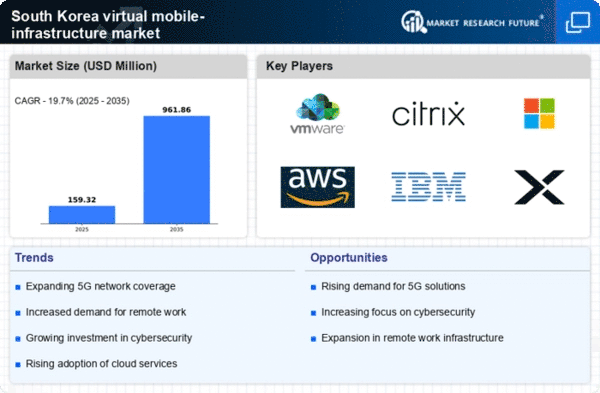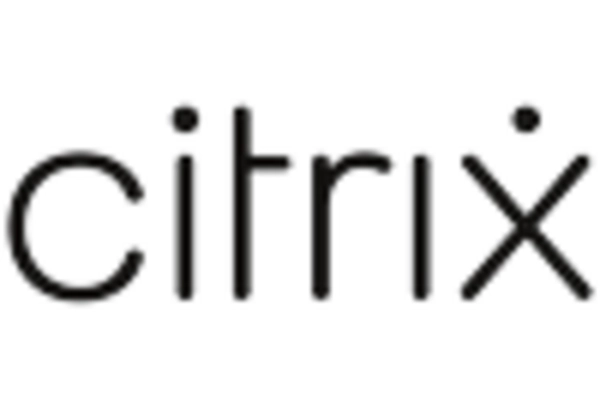Advancements in 5G Technology
The rollout of 5G technology in South Korea is poised to revolutionize the virtual mobile-infrastructure market. With download speeds potentially reaching 10 Gbps, 5G enables enhanced mobile connectivity and supports the increasing demand for data-intensive applications. This technological advancement is expected to drive a 40% increase in mobile data traffic over the next few years. As businesses leverage 5G capabilities, the need for sophisticated virtual mobile infrastructure solutions will likely grow. This trend suggests that the virtual mobile-infrastructure market will benefit from the enhanced performance and reliability offered by 5G, positioning it as a key enabler of digital transformation.
Rising Demand for Remote Work Solutions
The virtual mobile-infrastructure market in South Korea is experiencing a notable surge in demand for remote work solutions. As organizations increasingly adopt flexible work arrangements, the need for robust mobile infrastructure becomes paramount. This shift is evidenced by a reported 30% increase in remote work adoption among South Korean companies in the past year. Consequently, businesses are investing in virtual mobile infrastructure to ensure seamless connectivity and collaboration among employees. This trend is likely to continue, as companies recognize the benefits of enhanced productivity and employee satisfaction. The virtual mobile-infrastructure market is thus positioned to grow significantly, driven by the necessity for reliable and efficient remote work solutions.
Increased Focus on Data Privacy Regulations
In South Korea, the virtual mobile-infrastructure market is influenced by a heightened focus on data privacy regulations. Recent legislative changes have mandated stricter compliance measures for businesses handling sensitive information. As organizations strive to meet these regulatory requirements, there is a growing demand for secure virtual mobile infrastructure solutions. This trend is reflected in a 25% increase in investments in cybersecurity measures among South Korean firms over the past year. Consequently, the virtual mobile-infrastructure market is likely to expand as companies seek to implement robust security protocols to protect data and maintain compliance with evolving regulations.
Growing Interest in Mobile Application Development
The virtual mobile-infrastructure market in South Korea is witnessing a surge in interest surrounding mobile application development. As businesses recognize the importance of mobile apps in enhancing customer engagement and operational efficiency, there is a corresponding increase in demand for virtual mobile infrastructure to support these initiatives. Recent surveys indicate that 60% of South Korean companies plan to invest in mobile app development within the next year. This trend is likely to drive growth in the virtual mobile-infrastructure market, as organizations seek to create and deploy applications that require robust and scalable infrastructure to meet user expectations.
Government Initiatives Supporting Digital Transformation
The South Korean government is actively promoting digital transformation initiatives, which significantly impact the virtual mobile-infrastructure market. With investments exceeding $1 billion in digital infrastructure, the government aims to enhance connectivity and support technological advancements. These initiatives are designed to foster innovation and improve the overall digital ecosystem, encouraging businesses to adopt virtual mobile infrastructure solutions. As a result, the market is likely to witness accelerated growth, driven by government support and funding. This proactive approach not only enhances the competitiveness of South Korean enterprises but also positions the virtual mobile-infrastructure market as a critical component of the nation's digital economy.
















